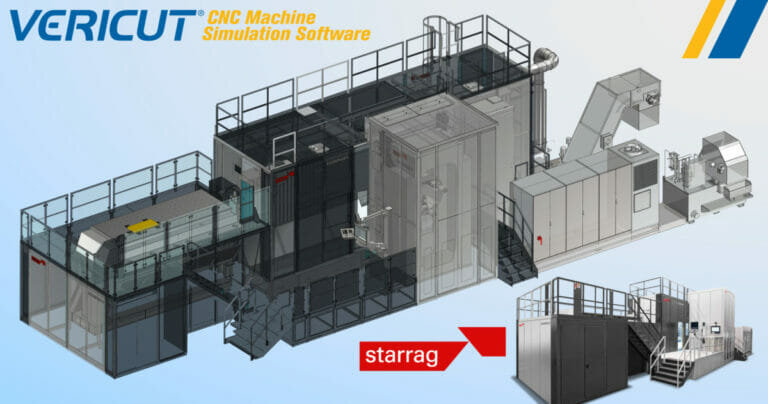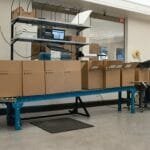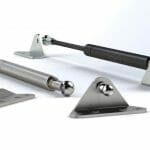From added technology value to efficiency boost: Machine tool manufacturer Starrag Group relies on NC simulation with VERICUT and program optimization with VERICUT Force
Question: “How long will it take to machine part XY using your XYZ machine?” Answer: “I can quickly tell you exactly how long it will take by simulating the process in VERICUT.” The dialog is fictitious – the scenario realistic. Not only because it is theoretically possible, but because the Swiss company Starrag Group, which specializes in precision cutting machine tools, uses VERICUT NC simulation software for this purpose. In addition to verification and optimization of NC programs, it provides a precise indication of the runtime of the optimized machining on the machine.
Starrag Group

Starrag Group develops, manufactures and sells precision machine tools with four, five and six axes for small to large workpieces, gantry machining centers and vertical lathes for large components, turning and grinding machines, associated software packages and special tools. Engineering and process optimization solutions are also part of the portfolio of the internationally active Swiss industrial company. Starrag solutions are used in aviation, power generation, transportation, precision engineering and medical technology. Headquartered in Rorschacherberg/Switzerland (aerospace, precision mechanical engineering), the group of companies with more than 1,500 employees has production sites in Switzerland, Germany, France, Great Britain and India as well as sales and service locations in the most important customer countries.
Validating the future through NC simulation
Thomas Fink (35) is head of application technology for machining centers at Starrag’s headquarters in Rorschacherberg. Located on the edge of Lake Constance, the company has relied on VERICUT as a market-leading solution for NC simulation for more than 30 years. “The range of applications is very diverse,” says Fink. “We use VERICUT in technology development for customer parts, conduct time and feasibility studies with it, and analyze customer programs in the event of problems or faulty machining.” Machine tool buyers naturally want to know what the machine is capable of in a specific application before they buy. So, as already outlined, Starrag builds a bridge to the future by means of NC simulation: the customer’s real NC program is checked for collisions etc. on the virtual machine in VERICUT. The real process is digitized on the basis of the NC program, with the help of the machining center’s Digital Twin. Phillip Block, Marketing Manager of CGTech Deutschland GmbH, which distributes VERICUT in the D.A.CH. region, classifies this process thematically. “VERICUT offers what Industry 4.0 is all about at its core: possibilities for high-level individualization, possibilities for the intelligent production of equally intelligent products, and extensive integration of customers and partners into the company’s value creation processes.”
Game changer in the quotation process
Thomas Fink confirms that it’s exactly the kind of added value that can make all the difference these days. “As a full-range supplier of machine tools with technology support, it’s often necessary to know the machining times for customer parts as early as the quotation process, in addition to selecting the right machine.” He continues, “When implementing customer projects, the NC programs can be tested, analyzed and optimized using VERICUT before the real customer machine is even set up.” The tools and clamping devices are also tested and optimized. “This makes it possible to ensure at a very early stage that the process will run without collisions, travel violations or damage to the part.” In this way, the safety factor as a mere snapshot of the present becomes a tangible reliability of expectation in the future. Thomas Fink is not surprised “that most of our customers use VERICUT for machine simulation,” and benefit directly from it. “Since our customers receive a Digital Twin of their purchased machine from us for pre-acceptance, they can check and optimize their processes even before the final acceptance of the machine. ”
Starrag as a machine manufacturer thinks in terms of product life cycles, so the use of VERICUT even in the case of service is not surprising. Fink states, “If problems occur during machining after the machine has been delivered to the customer, we are often provided with an NC program or a section of it. Thanks to VERICUT, it is then possible to analyze this with very little effort, detect any errors or suggest optimizations.”
Part of the process chain
Of course, Starrag Group also uses VERICUT classically in the simulation, verification and analysis of the NC programs with which Starrag Group manufactures components and parts for its own machines. VERICUT- currently available in version 9.1.2, simulates the original NC code after the post-processor has run and detects program errors such as rapid traverse errors or contour violations before real production. VERICUT is sold in a modular format, so companies purchase only the capabilities they need. At Starrag, this naturally includes feeding VERICUT with data from a central single source of truth. “Due to the close cooperation with various customers, Starrag uses several CAM systems,” says Fink. “For central management, a tool database is used that offers interfaces to all systems. The interfaces of the CAM systems to VERICUT are also used.”
Optimized manufacturing: VERICUT Force
As one of VERICUT’s early adopters, Starrag Group also uses the VERICUT Force optimization module. VERICUT Force is a physics-based NC program optimization software module that analyzes and optimizes cutting conditions throughout NC program operation. It delivers the most effective NC program for the given material, cutting tool and machining conditions. Dirk Weiß (CGTech’s sales manager for Switzerland, among others) compares the Force application to conventional simulation: “Force is not about milling strategies of existing programs; it also does not change tool paths. Material removal is kept constant by adjusting the feedrate, and subdividing toolpath motions as needed to maintain consistent machining conditions for each tool. Everything is controlled by the feed rate- the geometries are not changed in the process.” The result is significant time savings and improved cutting tool and machine life.
Avoiding tool breakage and deformation
At Starrag, VERICUT Force is used to optimize customer projects, design machine components and analyze NC programs in the event of tool breakage. Fink adds, “Tool breakages must be avoided, especially in demanding machining operations. The same applies to thin-walled parts, where avoiding deformation of the part due to excessive cutting forces is key.” This sums up VERICUT Force’s analytical potential to a tee: unsafe cutting conditions, excessive forces, metal removal rates, power, torque and tool deflections are graphically displayed during the visual analysis of the NC program. Lastly, VERICUT Force pays off in optimizing machining times so that customers have another competitive advantage with their robust and reliable Starrag machining centers. Thomas Fink illustrates this with the example of a demo part for a stator segment. This is based on similar customer parts and was developed as a technology demonstrator for an in-house exhibition. “The tool design, fixture design and CAM programming were completely checked in VERICUT and optimized in VERICUT Force. As a result, time was not wasted on prove-outs at the machine and the first part already met the desired requirements in terms of surface and geometric quality. And all this with a 20% reduction in machining time.”





